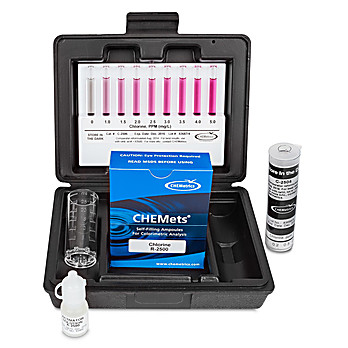Chlorine (Free & Total) CHEMets Kit, 0.1-2 ppm, Each

|
|
Details:
Because of its strong oxidizing properties, chlorine is an excellent biocide used to treat potable waters, municipal wastes, and swimming pools. When used to treat potable water, chlorine helps alleviate the adverse effects of iron, manganese, ammonia, and sulfide. The Maximum Residual Disinfectant Level for chlorine is 4 mg/L in drinking water.The DPD MethodReferences: USEPA Methods for Chemical Analysis of Water and Wastes, Method 330.5 (1983). APHA Standard Methods, 23rd ed Method 4500-Cl G- 2000.In the USEPA-accepted DPD methodology, free chlorine reacts with DPD to form a pink product. When ammonia or amines are present, some of the chlorine may exist as combined chlorine. Combined chlorine will not interfere with the free chlorine results, provided the readings are taken at one minute. To determine total chlorine (the sum of free and combined), use the A-2500 Activator Solution (potassium iodide) supplied in the kit. Results are expressed as ppm (mg/L) Cl2.The DPD method is also applicable to the direct determination of hypochlorite concentrations in various cleaning preparations and disinfectants prior to their dilution. DPD reacts with hypochlorite ions to form a pink color. Results are expressed as percent (%) NaOCl.The DDPD™ MethodReference: Developed by CHEMetricsThe DDPD™ method is derived from the DPD method. Test kits that employ this chemistry are well suited for use where biocides and chromate corrosion inhibitors are used simultaneously. DDPD reacts with free chlorine to form a purple product. When ammonia or amines are present in the sample, some of the chlorine may exist as combined chlorine. To determine total chlorine (the sum of free and combined), use the A-2500 Activator Solution (potassium iodide) that is supplied in the kit. Results are expressed as ppm (mg/L) Cl2.WARNING! This product can expose you to chemicals including formaldehyde, which is known to the State of California to cause cancer, and methanol, which is known to the State of California to cause birth defects or other reproductive harm. For more information go to www.P65Warnings.ca.gov.
Additional Information
| SKU | 5007448 |
|---|---|
| UOM | Each |
| UNSPSC | 41116100 |
| Manufacturer Part Number | K-2500 |

